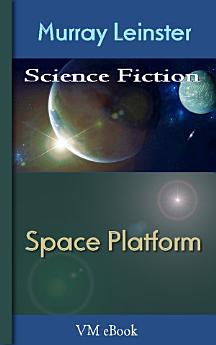Space Platform: Leinster'S Science Fiction
About this ebook
There wasn’t anything underneath but clouds, and there wasn’t anything overhead but sky. Joe Kenmore looked out the plane window past the co-pilot’s shoulder. He stared ahead to where the sky and cloud bank joined—it was many miles away—and tried to picture the job before him. Back in the cargo space of the plane there were four big crates. They contained the pilot gyros for the most important object then being built on Earth, and it wouldn’t work properly without them. It was Joe’s job to take that highly specialized, magnificently precise machinery to its destination, help to install it, and see to its checking after it was installed.
He felt uneasy. Of course the pilot and co-pilot—the only two other people on the transport plane—knew their stuff. Every imaginable precaution would be taken to make sure that a critically essential device like the pilot gyro assembly would get safely where it belonged. It would be—it was being—treated as if it were a crate of eggs instead of massive metal, smoothed and polished and lapped to a precision practically unheard of. But just the same Joe was worried. He’d seen the pilot gyro assembly made. He’d helped on it. He knew how many times a thousandth of an inch had been split in machining its bearings, and the breath-weight balance of its moving parts. He’d have liked to be back in the cargo compartment with it, but only the pilot’s cabin was pressurized, and the ship was at eighteen thousand feet, flying west by south....
About the author
Murray Leinster (June 16, 1896 – June 8, 1975) was a nom de plume of William Fitzgerald Jenkins, an award-winning American writer of science fiction and alternate history. He wrote and published more than 1,500 short stories and articles, 14 movie scripts, and hundreds of radio scripts and television plays.
Leinster was born in Norfolk, Virginia, the son of George B. Jenkins and Mary L. Jenkins. His father was an accountant. Although both parents were born in Virginia, the family lived in Manhattan in 1910, according to the 1910 Federal Census.
He began his career as a freelance writer before World War I; he was two months short of his 20th birthday when his first story, "The Foreigner", appeared in the May 1916 issue of H. L. Mencken's literary magazine The Smart Set. Over the next three years, Leinster published ten more stories in the magazine. During and after World War I, he began appearing in pulp magazines like Argosy, Snappy Stories, and Breezy Stories. He continued to appear regularly in Argosy into the 1950s. When the pulp magazines began to diversify into particular genres in the 1920s, Leinster followed suit, selling jungle stories to Danger Trails, westerns to West and Cowboy Stories, detective stories to Black Mask and Mystery Stories, horror stories to Weird Tales, and even romance stories to Love Story Magazine under the pen name Louisa Carter Lee.
Leinster's first science fiction story, "The Runaway Skyscraper", appeared in the February 22, 1919 issue of Argosy, and was reprinted in the June 1926 issue of Hugo Gernsback's first science fiction magazine, Amazing Stories. In the 1930s, he published several science fiction stories and serials in Amazing and Astounding Stories (the first issue of Astounding included his story "Tanks"). He continued to appear frequently in other genre pulps such as Detective Fiction Weekly and Smashing Western, as well as Collier's Weekly beginning in 1936 and Esquire starting in 1939.
Leinster is credited with the invention of parallel universe stories. Four years before Jack Williamson's The Legion of Time came out, Leinster published his "Sidewise in Time" in the June 1934 issue of Astounding. Leinster's vision of extraordinary oscillations in time ('sidewise in time') had a long-term impact on other authors, for example Isaac Asimov's "Living Space", "The Red Queen's Race", and The End of Eternity.












